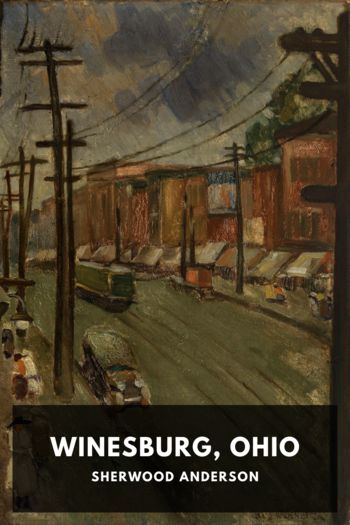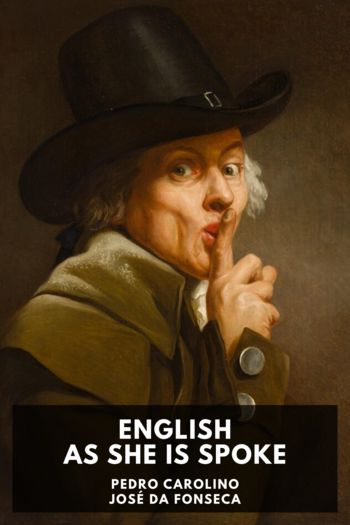Winesburg, Ohio, Sherwood Anderson [web based ebook reader txt] 📗

- Author: Sherwood Anderson
Book online «Winesburg, Ohio, Sherwood Anderson [web based ebook reader txt] 📗». Author Sherwood Anderson
Wing Biddlebaum talked much with his hands. The slender expressive fingers, forever active, forever striving to conceal themselves in his pockets or behind his back, came forth and became the piston rods of his machinery of expression.
The story of Wing Biddlebaum is a story of hands. Their restless activity, like unto the beating of the wings of an imprisoned bird, had given him his name. Some obscure poet of the town had thought of it. The hands alarmed their owner. He wanted to keep them hidden away and looked with amazement at the quiet inexpressive hands of other men who worked beside him in the fields, or passed, driving sleepy teams on country roads.
When he talked to George Willard, Wing Biddlebaum closed his fists and beat with them upon a table or on the walls of his house. The action made him more comfortable. If the desire to talk came to him when the two were walking in the fields, he sought out a stump or the top board of a fence and with his hands pounding busily talked with renewed ease.
The story of Wing Biddlebaum’s hands is worth a book in itself. Sympathetically set forth it would tap many strange, beautiful qualities in obscure men. It is a job for a poet. In Winesburg the hands had attracted attention merely because of their activity. With them Wing Biddlebaum had picked as high as a hundred and forty quarts of strawberries in a day. They became his distinguishing feature, the source of his fame. Also they made more grotesque an already grotesque and elusive individuality. Winesburg was proud of the hands of Wing Biddlebaum in the same spirit in which it was proud of Banker White’s new stone house and Wesley Moyer’s bay stallion, Tony Tip, that had won the two-fifteen trot at the fall races in Cleveland.
As for George Willard, he had many times wanted to ask about the hands. At times an almost overwhelming curiosity had taken hold of him. He felt that there must be a reason for their strange activity and their inclination to keep hidden away and only a growing respect for Wing Biddlebaum kept him from blurting out the questions that were often in his mind.
Once he had been on the point of asking. The two were walking in the fields on a summer afternoon and had stopped to sit upon a grassy bank. All afternoon Wing Biddlebaum had talked as one inspired. By a fence he had stopped and beating like a giant woodpecker upon the top board had shouted at George Willard, condemning his tendency to be too much influenced by the people about him, “You are destroying yourself,” he cried. “You have the inclination to be alone and to dream and you are afraid of dreams. You want to be like others in town here. You hear them talk and you try to imitate them.”
On the grassy bank Wing Biddlebaum had tried again to drive his point home. His voice became soft and reminiscent, and with a sigh of contentment he launched into a long rambling talk, speaking as one lost in a dream.
Out of the dream Wing Biddlebaum made a picture for George Willard. In the picture men lived again in a kind of pastoral golden age. Across a green open country came clean-limbed young men, some afoot, some mounted upon horses. In crowds the young men came to gather about the feet of an old man who sat beneath a tree in a tiny garden and who talked to them.
Wing Biddlebaum became wholly inspired. For once he forgot the hands. Slowly they stole forth and lay upon George Willard’s shoulders. Something new and bold came into the voice that talked. “You must try to forget all you have learned,” said the old man. “You must begin to dream. From this time on you must shut your ears to the roaring of the voices.”
Pausing in his speech, Wing Biddlebaum looked long and earnestly at George Willard. His eyes glowed. Again he raised the hands to caress the boy and then a look of horror swept over his face.
With a convulsive movement of his body, Wing Biddlebaum sprang to his feet and thrust his hands deep into his trousers pockets. Tears came to his eyes. “I must be getting along home. I can talk no more with you,” he said nervously.
Without looking back, the old man had hurried down the hillside and across a meadow, leaving George Willard perplexed and frightened upon the grassy slope. With a shiver of dread the boy arose and went along the road toward town. “I’ll not ask him about his hands,” he thought, touched by the memory of the terror he had seen in the man’s eyes. “There’s something wrong, but I don’t want to know what it is. His hands have something to do with his fear of me and of everyone.”
And George Willard was right. Let us look briefly into the story of the hands. Perhaps our talking of them will arouse the poet who will tell the hidden wonder story of the influence for which the hands were but fluttering pennants of promise.
In his youth Wing Biddlebaum had been a school teacher in a town in Pennsylvania. He was not then known as Wing Biddlebaum, but went by the less euphonic name of Adolph Myers. As Adolph Myers





Comments (0)